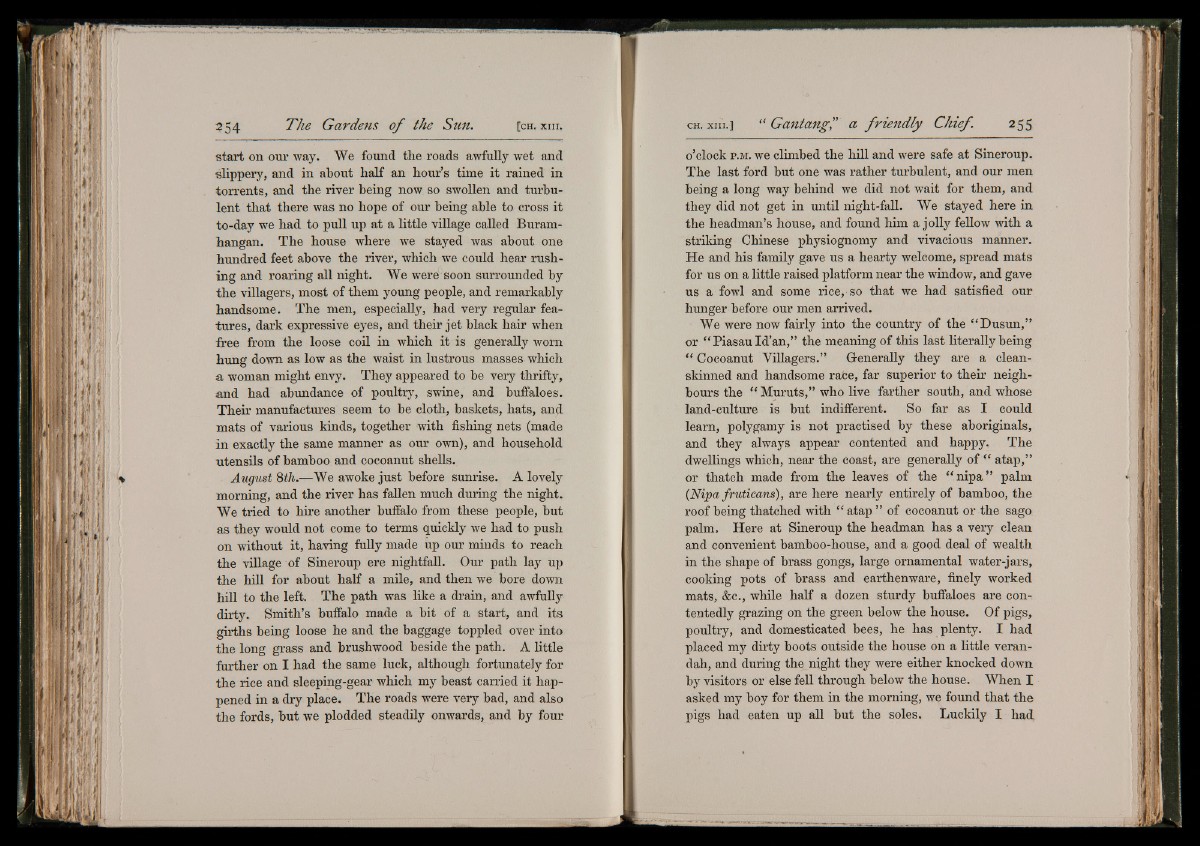
start on our way. We found the roads awfully wet and
slippery, and in about half an hour’s time it rained in
torrents, and the river being now so swollen and turbulent
that there was no hope of our being able to cross it
to-day we had to pull up at a little village called Buram-
hangan. The house where we stayed was about one
hundred feet above the river, which we could hear rushing
and roaring all night. We were soon surrounded by
the villagers, most of them young people, and remarkably
handsome. The men, especially, had very regular features,
dark expressive eyes, and their jet black hair when
free from the loose coil in which it is generally worn
hung down as low as the waist in lustrous masses which
a woman might envy. They appeared to he very thrifty,
and had abundance of poultry, swine, and buffaloes.
Their manufactures seem to he cloth, baskets, hats, and
mats of various kinds, together with fishing nets (made
in exactly the same manner as our own), and household
utensils of bamboo and cocoanut shells.
August 8th.—We awoke just before sunrise. A lovely
morning, and the river has fallen much during the night.
We tried to hire another buffalo from these people, hut
as they would not come to terms quickly we had to push
on without it, having fully made up our minds to reach
the village of Sineroup ere nightfall. Our path lay up
the hill for about half a mile, and then we bore down
hill to the left. The path was like a drain, and awfully
dirty. Smith’s buffalo made a bit of a start, and its
girths being loose he and the baggage toppled over into
the long grass and brushwood beside the path. A little
further on I had the same luck, although fortunately for
the rice and sleeping-gear which my beast carried it happened
in a dry place. The roads were very bad, and also
the fords, but we plodded steadily onwards, and by four
o’clock p .m . we climbed the hill and were safe at Sineroup.
The last ford but one was rather turbulent, and our men
being a long way behind we did not wait for them, and
they did not get in until night-fall. We stayed here in
the headman’s house, and found him a jolly fellow with a
striking Chinese physiognomy and vivacious manner.
He and his family gave us a hearty welcome, spread mats
for us on a little raised platform near the window, and gave
us a fowl and some rice, so that we had satisfied our
hunger before our men arrived.
We were now fairly into the country of the “ Dusun,”
or “ Piasau Id’an,” the meaning of this last literally being
“ Cocoanut Villagers.” Generally they are a cleanskinned
and handsome race, far superior to their neighbours
the “ Muruts,” who live farther south, and whose
land-culture is but indifferent. So far as I could
learn, polygamy is not practised by these aboriginals,
and they always appear contented and happy, The
dwellings which, near the coast, are generally of “ atap,”
or thatch made from the leaves of the “ nipa ” palm
(Nipa fruticans), are here nearly entirely of bamboo, the
roof being thatched with “ atap ” of cocoanut or the sago
palm, Here at Sineroup the headman has a very clean
and convenient bamboo-house, and a good deal of wealth
in the shape of brass gongs, large ornamental water-jars,
cooking pots of brass and earthenware, finely worked
mats, &c., while half a dozen sturdy buffaloes are contentedly
grazing on the green below the house. Of pigs,
poultry, and domesticated bees, he has plenty. I had
placed my dirty boots outside the house on a little verandah,
and during the night they were either knocked down
by visitors or else fell through below the house. When I
asked my boy for them in the morning, we found that the
pigs had eaten up all but the soles. Luckily I had